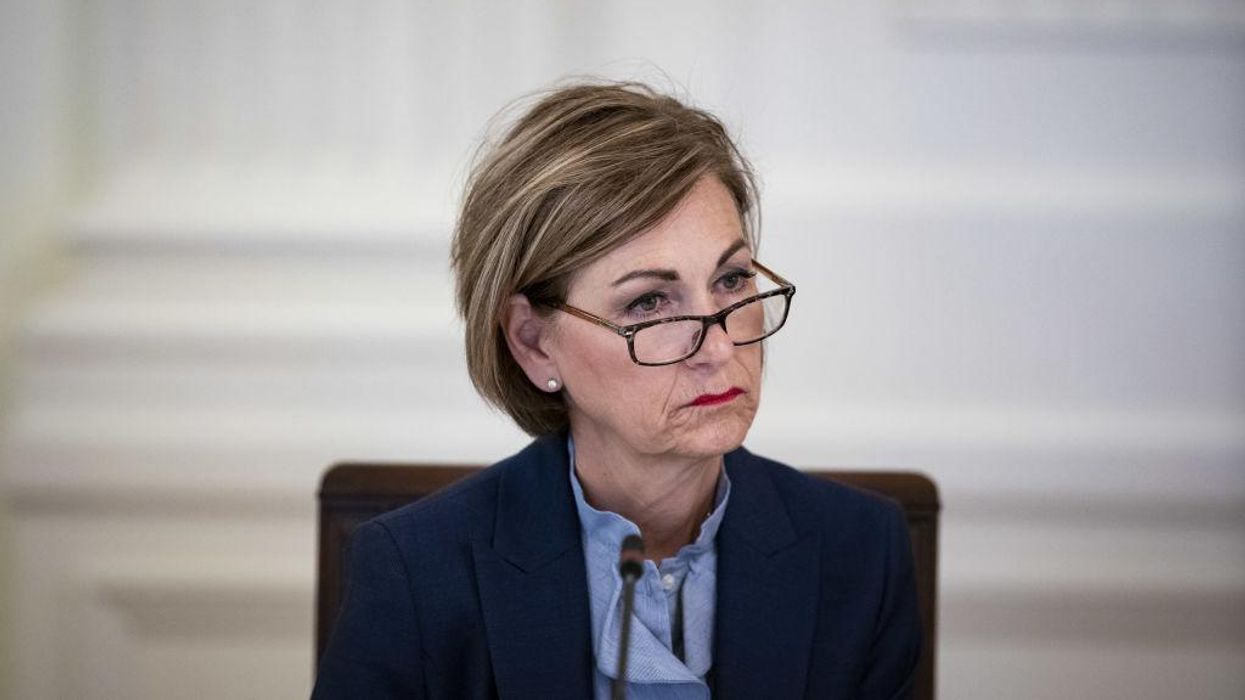
Al Drago/Bloomberg via Getty Images

Editor's note: The subject matter of this article contains graphic content.
Iowa Gov. Kim Reynolds (R) spoke up in favor of parental rights Monday, telling a local news outlet that parents should decide what is and is not appropriate for their children in schools.
Concerned parents across the nation are butting heads with school districts over certain books available in school libraries, and whether those books — some of which contain explicit sexual content — are appropriate for school-age children. This debate is playing out across six school districts in the Des Moines Metro area of Iowa, where school officials are examining the content of several books deemed objectionable by parents.
During an interview with KCCI-TV, Reynolds read aloud from one of the controversial books, "All Boys Aren't Blue," by George M. Johnson, a series of essays that the author describes as a "memoir-manifesto" of what it was like to grow up as a gay black person. Johnson is homosexual and identifies as non-binary.
A reporter with KCCI asked the governor if she supports comments made by Republican state Senate President Jake Chapman, who recently said Iowa teachers unions have a "sinister agenda" and want to "normalize sexually deviant behavior against our children, including pedophilia and incest." Those comments drew outrage from teachers, who said they were offensive and untrue.
"If you're talking about, do I think inappropriate things are being displayed in libraries, and in classrooms, across the state? From what I've heard from parents, I absolutely agree with that," Reynolds told KCCI, declining to comment directly on Chapman's remarks.
She then read a passage from "All Boys Aren't Blue" that contains a graphic description of a sexual act between two boys who are cousins.
"You told me to take my pajamas, my pajama pants, which I said to take off my pajama pants, which I told you when, which I did. You then took off your shorts, followed by your boxers," she read from the book. "There you stood in front of me, fully erected and said, 'Taste it.' At first, I laughed and refused. But then you said, 'come on, Matt, taste it. This is what boys like us do when we like each other.' I finally listened to you. The whole time I knew it was wrong, not because I was having sexual intercourse with a guy, but that you were my family. I only did that for about 45 seconds before you had me stop. Then you got down on your hands and knees and told me to close my eyes, and that's when you began oral sex on me as well."
"So I don't know if parents feel that that is appropriate for children in K-12 education," Reynolds told KCCI after reading the passage. "Then I think that's a that's a decision for parents to make."
She went on to say that parents have a right to determine what their children are taught in schools.
“These are the parents’ children, they’re not ours, they’re not the government’s, they’re not the school district’s,” she said. “They’re the parents’ children and they have a right to say, to weigh in on their children’s education.”
Iowa Gov. Kim Reynolds: "Parents\nmatter. \n\nThese are the parents' children.\nThey're not the government's.\nThey're not the school district's. \n\nThey're the parents' children. And they have a right to say, to weigh in, on their children's education."pic.twitter.com/D2nb5wZZoW— Corey A. DeAngelis (@Corey A. DeAngelis) 1643039033
While schools across the nation are removing "All Boys Aren't Blue" from libraries, the author has defended the work as an important message foryoung adults, who may be struggling with their sexuality.
"The reality is there is no topic that is too heavy for a child who could experience said topic. If a child can experience sexual abuse at the age of seven, a child should understand what sexual abuse looks like, how to handle it, how to discuss it, and how to talk about it," Johnson told CBS News last November.
"The repercussions of removing a resource like mine doesn't mean youth, specifically Black queer youth won't experience these things. What it does is remove an educational tool for them to have the knowledge and the wherewithal to understand how to handle those situations."
Other books challenged in Iowa include "Lawn Boy" by Jonathon Evison and "Gender Queer" by Maia Kobabe, each of which contains graphic depictions of sex.